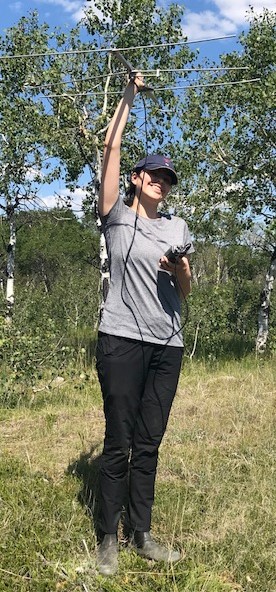Chronic wasting disease (CWD) is a contagious,  neurodegenerative disease that effects members of the deer family such as mule deer, white-tailed deer, elk, reindeer, and moose. The disease primarily effects the lymphatic and nervous systems of infected individuals which invariably leads mortality. In Alberta, 326 deer tested CWD-positive in 2018 with mule deer representing a majority of positive cases.
neurodegenerative disease that effects members of the deer family such as mule deer, white-tailed deer, elk, reindeer, and moose. The disease primarily effects the lymphatic and nervous systems of infected individuals which invariably leads mortality. In Alberta, 326 deer tested CWD-positive in 2018 with mule deer representing a majority of positive cases.
As the disease continues to spread further into western Alberta it has become a major concern for wildlife management as it has the potential to dramatically reduce deer populations.
My research aims to examine the habitat use, movement and contact rates of mule deer in Canadian Forces Base Wainwright and the Ribstone Creek Heritage Rangeland in the East Central Alberta. We have deployed several types of GPS collars equipped with proximity sensors on mule deer in both study areas. I plan to use the data obtained from the collars to better understand the effects of population structure, sociality and environmental factors that influence contact dynamics and apply this knowledge to larger scale population models that are applicable across broader regions to predict the spread of CWD.
Congratulations to Maria Dobbin for the successful completion of her MSc. degree. Maria’s defense entitled, “Implications of direct contacts between mule deer (Odocoileus hemionus) on transmission of chronic wasting disease” was on March 28, 2022.
Awards:
GSA Graduate Student Teaching Assistant Award (2020)
Alberta Graduate Excellent Scholarship Award (2020)
NSERC Undergraduate Student Research Award (2018)
Funding Agencies:
NSERC
Presentations:
2022
Thesis defence – Implications of direct contacts between mule deer (Odocoileus hemionus) on transmission of chronic wasting disease – March 28, 2022.
2020
Contact rates for disease transmission: Do metrics matter? Oral Presentation, 2020 ACTWS Conference, Camrose, AB, March 13-15, 2020 (cancelled due to COVID-19)
Seasonal Delineation: Defining Seasons Using Pairwise Movements. Oral presentation, CWD Group Meeting, University of Alberta, February 24, 2020
2019
Analysis of mule deer contacts in a CWD endemic area. Oral presentation, CWD Group Meeting, University of Alberta, November 21, 2019
Relating spatial contact metrics to possible transmission routes of CWD. Landscape Ecology course, University of Alberta, April 8, 2019